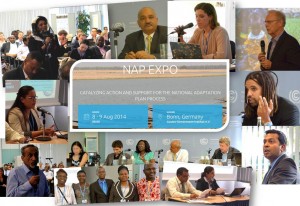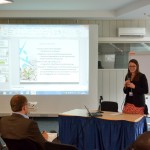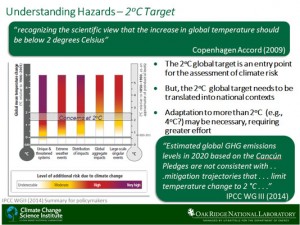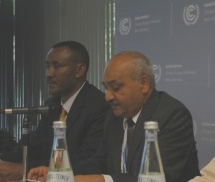

 Representatives from more than 74 countries – including 47 LDCs – gathered to share experiences and to discuss support for the NAP process.
Representatives from more than 74 countries – including 47 LDCs – gathered to share experiences and to discuss support for the NAP process.
Many LDCs are in the process of developing NAP processes. This two-day NAP Expo in Bonn was an opportunity to mobilize action and support for the formulation and implementation of NAPs, to share technical knowledge and tools, and identify gaps and needs of LDCs and other developing countries as they undertake their NAP process.
This was the second NAP Expo, following up on a June 2013 event which marked the launch of the NAP process in LDCs. The Expo was convened by the Least Developed Countries Expert Group (LEG) with the support of the UNFCCC Secretariat.
The event brought together approximately 200 participants, comprising representatives of governments, UN agencies, NGOs, environmental organisations, universities, UN agencies, development agencies and adaptation experts and members of civil society groups.
Batu Uprety, Chairman of the LEG, in opening the event. said:
“Many LDCs are working on their NAP processes. Much has been achieved, yet further challenges remain.”
 Discussion on NAPs:
Discussion on NAPs:
A rich array of topics were covered by speakers. Many spoke of the importance of adaptation in the wider development context, the requirement for ongoing, country-driven NAP support, and the need to integrate climate science with policy and actions. The climate change risk management perspective was also the subject of much discussion, alongside the need to understand the climate adaptation challenges and potential hazards faced.
“Training and capacity-building is essential for effective adaptation and for developing future leaders in climate change adaptation.”
Hassan Virji, Executive Director for Global Change System for Analysis, Research and Training (START)
“We need to move from a mechanistic stage towards the NAPs, which requires a strong link with science.”
Anand Patwardhan GEF/STAP
We need to recognize the scientific viewpoint that the increase in global temperature must remain below 2 degrees C – which is the entry point for the assessment of climate risk.”
Benjamin Preston, ORNL/IPCC
 Except from Benjamin Preston’s talk on “Assessing and managing climate change risk”
Except from Benjamin Preston’s talk on “Assessing and managing climate change risk”
Thematic sessions
Key thematic sessions took place on science and policy interaction, building readiness for the Green Climate Fund (GCF), support programmes for implementation (including the NAP Global Support Programme for LDCs implemented by UNDP, UNEP and other parters) and accessing GEF support for adaptation, amongst other sessions. A Poster Exhibition allowed participants to explore some of the issues through infographics, photos and programme highlights.
Donald Wilhite, University of Linoln, N.E, gave a final keynote speech highlighting the relevance of national drought management to NAPs, and introduced the global initiative on integrated drought management programme under WMO, GWP and other partners.
 H. E. Mr. Kare Chawicha Debessa,
H. E. Mr. Kare Chawicha Debessa,
State Minister, Ministry of Environment and Forests, Ethiopia, highlighted the event’s importance in a concluding speech, stating:
“This event has been critical in knowledge sharing and communications about the NAPs. We have many challenges and it is vitally important for us to collaborate and raise awareness to help us all to adapt to climate change.”